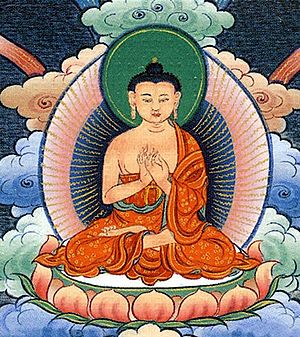Garab Dorje

Garab Dorje (Skt. Prahevajra/Pramodavajra/Surativajra[1]; Tib. དགའ་རབ་རྡོ་རྗེ་, Wyl. dga' rab rdo rje) — the lineage of Dzogchen, unbroken to the present day, is traced from the dharmakaya Samantabhadra (‘Kuntuzangpo’ in Tibetan) to the sambhogakaya, represented by the five buddha families and Vajrasattva, and then to the first human master Garab Dorje. It then passed to Mañjushrimitra. At the time of his parinirvana, Garab Dorje ascended into the sky and dissolved into rainbow light. At this, Mañjushrimitra cried out in despair and distress, and made a very beautiful plea: “What will become of us now that you are passing away? You are the light of the world…”
Whereupon Garab Dorje was moved, and his hand reappeared, in which was a small golden casket, the size of a thumbnail, containing the teaching of Hitting the Essence in Three Words, which he let fall into the hand of Mañjushrimitra. As soon as he received it, his mind became the same as the wisdom mind of his master Garab Dorje.
Famous Quotes
|
Three Statements
ཐག་གཅིག་ཐོག་ཏུ་བཅད། །
Introducing directly the face of rigpa in itself,
Decide upon one thing and one thing only,
Confidence directly in the liberation of rising thoughts.
Rigpa & Dharmakaya
རིག་པ་ཐོལ་སྐྱེས་སྐད་ཅིག་དྲན་པ་དེ། །
རྒྱ་མཚོའི་གཏིང་ནས་ནོར་བུ་རྙེད་པ་འདྲ། །
"When, from out of the primordially pure Dharmadhatu,
Suddenly Rigpa arises, and with it there is an instantaneous recognition, it is
Like finding a precious jewel in the depths of the ocean,
No-one has created it - it is just the Dharmakaya".
Notes
- ↑ Garab Dorje is best known by the Tibetan version of his name. Various attempts have been made to reconstruct his name in Sanskrit, usually giving it as Prahevajra, but also as Pramodavajra or Surativajra.
- ↑ Zenkar Rinpoche says that the text has a variant reading, མ་བརྩོལ་ meaning “without effort.” However both mean without mental fabrication or manipulation.
Further Reading
- John Reynolds, Golden Letters (Ithaca: Snow Lion, 1996), Part Two, 'The Life of Garab Dorje and Guru Sadhana'.